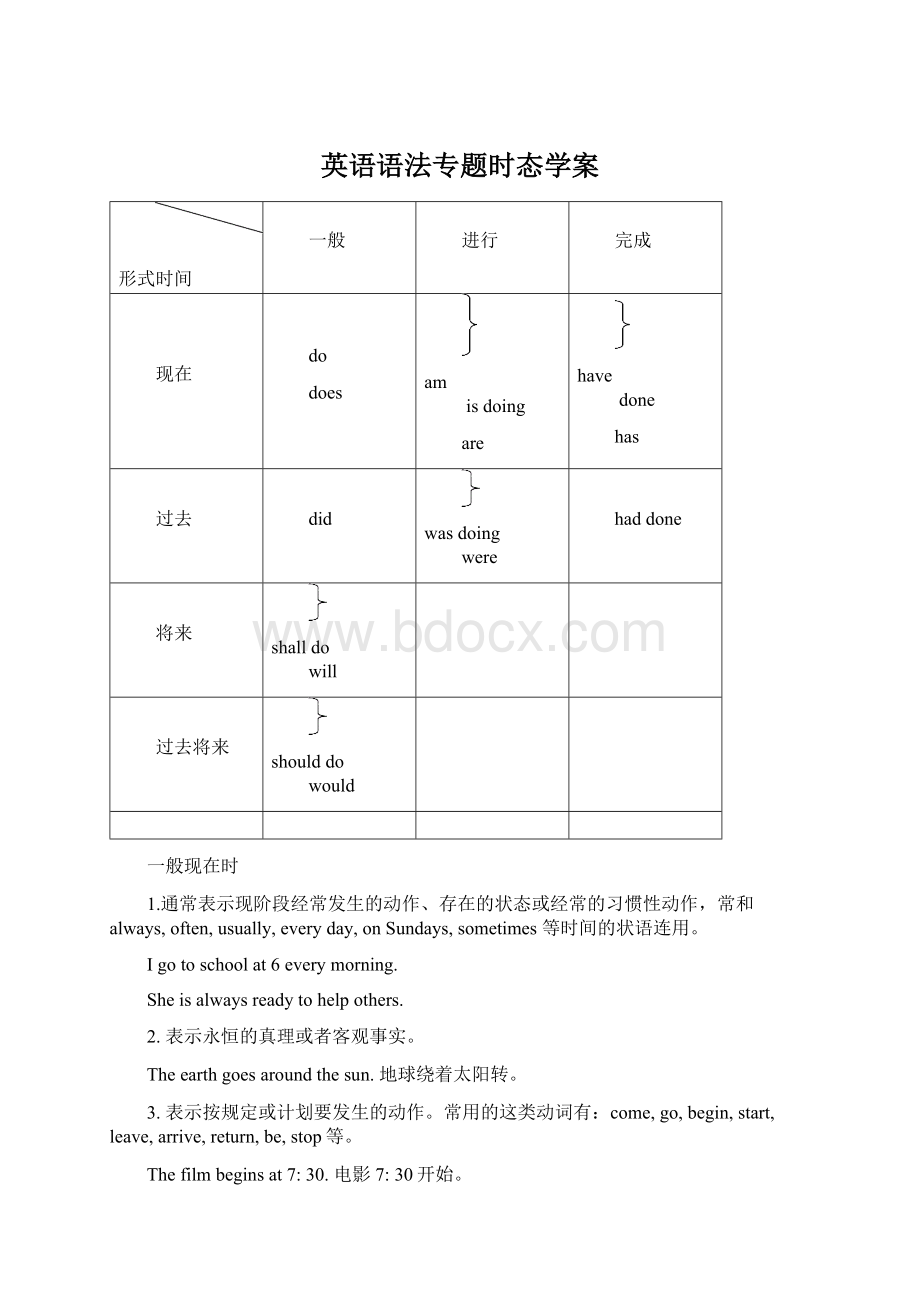英语语法专题时态学案.docx
《英语语法专题时态学案.docx》由会员分享,可在线阅读,更多相关《英语语法专题时态学案.docx(13页珍藏版)》请在冰豆网上搜索。

英语语法专题时态学案
形式时间
一般
进行
完成
现在
do
does
am
isdoing
are
have
done
has
过去
did
wasdoing
were
haddone
将来
shalldo
will
过去将来
shoulddo
would
一般现在时
1.通常表示现阶段经常发生的动作、存在的状态或经常的习惯性动作,常和always,often,usually,everyday,onSundays,sometimes等时间的状语连用。
Igotoschoolat6everymorning.
Sheisalwaysreadytohelpothers.
2.表示永恒的真理或者客观事实。
Theearthgoesaroundthesun.地球绕着太阳转。
3.表示按规定或计划要发生的动作。
常用的这类动词有:
come,go,begin,start,leave,arrive,return,be,stop等。
Thefilmbeginsat7:
30.电影7:
30开始。
Thenextbusleavesat11:
00.下一辆公共汽车11:
00离开。
4.在时间或者条件状语从句中,主句谓语动词是一般将来时,从句谓语动词用一般现在时。
“主将从现”。
I'lltellhimthenewswhenhecomesback.
5.否定形式:
Idon’tlikeplayingfootball.Hedoesn’tlikereadingbooks.
6.一般疑问句:
Doyoulikereadingbooks?
Yes,Ido/No,Idon’t
Doeshelikereadingbooks?
Yes,hedoes/No,hedoesn’t
即学即练
1.用动词的适当形式填空
1.Doeshe_________(like)______________(jump)?
2._________youstudyEnglishatschool?
Yes,I___________.(do)
3.We_________(go)toschoolatseveninthemorning.
4.Mike________(go)toschoolatseveninthemorning
5.Ican________(draw)manybeautifulpictures.
6.I________(write)toyouassoonasI_______(get)toLondon.
2.改写句子
Ihavemanybooks.
改为否定句:
_______________________________________________________
改为一般疑问句+肯定回答_______________________________________________
主语改为she:
__________________________________________________________
对划线部分提问:
______________________________________________________
一般过去时
1.表示在过去某个时间发生的动作或情况。
常用时间状语有:
yesterdaymorning/afternoon,lastnight/month/year,threedaysago,in1999,justnow,atthattime等。
例:
Iwasastudenttwoyearsago.两年前我是一个学生。
2.一般过去时的句式结构:
肯定句式:
主语+过去式
否定句式:
主语+助动词didn't+动词原形
疑问句式:
助动词Did+主语+动词原形?
特殊疑问句式:
疑问词+did+主语+动词原形+其它?
3.—般过去时的用法:
(1)表示过去某个时间发生的动作或存在的状态。
Wesawherinashopthismorning.今天早上我们看见她在一家商店里。
(2)表示过去习惯性、经常性的动作或行为。
Heusuallywenttoschoolbybikelastyear.他去年通常骑自行车去学校。
Mybrotherwasoftenlateforschoollastweek.上个星期我弟弟经常上学迟到。
(3)表示刚刚发生的事情。
Whatdidyousay?
你说什么?
训练第一关:
小小单词难不到我。
请写出下列动词的过去式。
want __ arrive __ enjoy ___ go ___
buy __ _ see ___ _ break _ __ put ____
训练第二关:
生病的句子能奈我何?
请在仔细诊断每个句子后,把正确的句子写在横线上。
1.Wegotoschoolearlyyesterday.
___________________________________________
2.Shebuyedadresslastweek.
___________________________________________
3.Didyoulikedplayingfootball?
___________________________________________
4.Wedidn’tflewkiteslastmonth.
___________________________________________
训练第三关:
用所给动词的适当形式填空
1.I______(watch)acartoononSaturday.
2.Herfather_______(read)anewspaperlastnight.
3.______you_______(visit)yourrelativeslastSpringFestival?
4.______he_______(fly)akiteonSundays?
Yes,he______.
5.GaoShan_______(put)upthepicturelastnight.
现在进行时
1.基本结构:
1)陈述句:
am/is/are+doing
2)否定句:
am/is/are+not+doing
3)一般疑问句:
Am/is/are+主语+其他成分?
肯定回答:
Yes,主语+be。
否定回答:
No,主语+be+not。
They’rehavingameeting.他们在开会。
I’mstudyingataneveningschool.我在上夜校。
IsMikecominghomeonThursday?
迈克星期四回来吗?
They’rehavingapartynextweek.下星期他们将开一个晚会。
Sheisnotworkingforthecompanynow。
她现在已经不在这家公司上班了
2.用法
1)“说话、写文章的当下”正在发生的动作。
例如:
Theyarehavingafootballmatch.他们正在赛足球。
。
2)“现阶段”一直在进行的动作。
这种情况并不是说某个动作在说话的那会儿正在发生,而是说某个动作在当前一段时间内一直在进行着,或是重复地发生着。
HeispreparingforCET-6.他在为大学英语六级考试作准备。
Howareyougettingalongwithyournewjob?
你那份新工作干得怎么样?
3)有时,现在进行时也与always等副词连用,表示反复出现的习惯性动作,用以表达说话人赞扬,讨厌等情绪。
例如:
Heisalwaysthinkingofothers,notofhimself.
他总是为他人着想,而不为自己(表示赞许)。
Oneofmyroommatesisconstantlyleavingthingsabout.
我的一个室友老是乱扔东西(表示不满)。
Somesellersareoftenknockingatourdoorandpromotingtheirproductstous.
有些推销员老是敲我家的门,向我们推销他们的产品(表示不喜欢)。
3.特殊用法
现在进行时表将来,主要表示按计划或安排要发生的动作:
I’mleavingtomorrow.我明天走。
They’regettingmarriednextmonth.他们下个月结婚。
现在进行时与一般现在时均可表示将来,区别是:
用现在进行时表示将来,强调计划性;而一般现在时表示将来,则多指按时刻表或规定要发生的情况:
eg.I’mnotgoingoutthisevening.今晚我不准备出去。
eg.Whattimedoesthetrainleave?
火车什么时候开?
4.即学即练:
1.Theboyisplayingbasketball.
否定句:
___________________________________________________________
一般疑问句:
_______________________________________________________
肯定回答:
_________________________________________________________
否定回答:
_________________________________________________________
对Theboy提问:
____________________________________________________
2.用所给动词的正确形式填空
1).Mr.Zhen_______________(read)abooknow.
2).Therabbits_________________(jump)now.
3).Look!
TomandJohn________________(swim).
过去进行时
1.基本结构:
1)陈述句:
主语+was/were+doing
2)否定句:
主语+was/werenot+doing
3)一般疑问句:
Was/were+主语+doing?
肯定回答:
yes,主语+was/were
否定回答:
No,主语+was/were+not
IwashavingatalkwithLiHuaatthattime.那时,我正在跟李华谈话。
Wewerehavingsupperwhenthephonerang.我们正在吃晚饭时电话响了。
ThistimeyesterdayJackwasnotwatchingTV.昨天这个时候杰克不是看电视。
Washerepairinghisbike?
他当时是在修理自行车吗?
2.用法
主要表示过去某一时间正在进行的动作。
如:
Hefellasleepwhenhewasreading.他看书时睡着了
3.特殊用法
表示过去将来要发生的动作。
例如:
WhenNationalDaywascomingnear,theybegantomakeaplanfortheholiday.
国庆节即将来临的时候,他们开始制订度假计划。
ShetoldmethatshewasgoingtoHainanforherholiday.她告诉我她将去海南度假。
4.即学即练:
用所给动词的正确形式填空
1)A:
Wasyourfatherathomeyesterdayevening?
B:
Yes,hewas.He_____(listen)totheradio.
2)A:
What_____you___(do)atthattime?
B:
We_____(watch)TV.
单项选择
1.I______amealwhenyou_____me.
A.cooked,wereringingB.wascooking,rang
C.wascooking,wereringingD.cooked,rang
2.Hesaidhe_____todrawaplaneontheblackboardatthattime.
A.triesB.triedC.wastryingD.willtry
综合练习:
一.用所给动词的正确形式填空
1.Listen!
Someone_________________(come).
2.They___________________(catch)butterfliesyesterday.
3.He______________________(do)anexperimenttomorrow.
4.Tom__________________(watch)TVinthediningroomat8lastnight.
5.Comeon.They_________________(leave)now.
6.We_______________________(eat)fishtonight.
7.Myfather__________________(work)forthecompany
二.单项选择
1.Whileshe______TV,she______asoundoutsidetheroom.
A.waswatching,washearingB.watched,washearing
C.watched,heardD.waswatching,heard
2.Iwilltellhimassoonashe_____back
A.comeB.comesC.willcomeD.came
3.Smithdoesnotgofishingonweekdays,____?
_____,hedoes.
A.doeshe…NoB.doeshe…Yes
C.doesn'the…NoD.doesn'the…Yes
4.They_____afootballgamefrom7to9lastnight.
A.werewatchingB.watchC.watchedDarewatching
5.Whatbook____you______whenI____youatfouryesterdayafternoon?
A.did,read,wasseeingB.did,read,saw
C.were,reading,sawD.were,reading,wasseeing
6.______asportsmeetlastSunday?
Yes,they______.
A.Didtheyhave…didB.Didtheyhave…had
C.Hadthey…hadD.Hadthey…did
7.I_____tothecinema.I______thereeverySunday.
A.go…goB.amgoing…go
C.go…amgoingD.amgoing…amgoing
8.____you_____outforawalkaftersupper?
Yes,I______.
A.Did…went…wentB.Did…go…went
C.Did…went…didD.Did…go…did
9.LeiFeng_____always_____ofotherswhenhe______inthearmy.
A.is,thinking,wasB.was,thinking,is
C.did,think,isD.was,thinking,was
10.Heoften_________supperat6:
00intheevening.
A.have B.has c.ishaving D.iseating
11.Hisparentswantedtoknowhowhe_____onwithhisnewclassmates.
A.wasgettingB.getsC.isgettingD.willget
12.We_____________anyChineseclassesonFriday.
A.arehaving B.aren’thaving C.don’thave D.arehave
13--Whendidthecomputercrash?
--Thismorning,whileI___thereadingmaterialsdownloadedfromsomewebsites.
A.havesortedB.wassortingC.amsortingD..hadsorted
14“Themoment_____soon,”hethoughttohimself,waitingnervously.
A.cameB.hascomeC.wascomingD.iscoming
15—DidyoucatchwhatIsaid?
--Sorry.I____atextmessagejustnow.
A.hadansweredB.haveansweredC.wouldanswerD.wasanswering
现在完成时
1.句式结构:
肯定句式:
主语+助动词have(has)+过去分词
否定句式:
主语+助动词haVe(has)+not+过去分词
疑问句式:
助动词Have(Has)+主语+过去分词
2.用法:
①表示动作在过去发生,且终止于过去,但其结果对现在仍有影响。
常与以下时间状语连用:
already(已经),just(刚刚),yet(已经,还),ever(曾经),never(从不),recently(最近),thelastfewyears(前几年)等。
Hehasalreadygonethere.他已经去那里了。
②表示开始于过去并持续至今,且还有可能继续下去的动作。
此时通常可与表示一段时间的状语连用。
Theyhavestayedinthevillageforsixyears.他们已经在这个村庄呆了六年。
③现在完成时常与“for+表示时间段的词”或“since+表示时间点的词”连用,前者表示“用了……时间”,后者表示“自……起”。
Wehavestudiedhereforfiveyears.我们已经在这儿学习了五年。
Hehasn'tvisitedhisparentsagainsince1999.
自1999年起他没有再次去看过他的父母。
3.特别提示:
①现在完成时不能和表示过去的时间状语(yesterday,lastnight,twodaysago,in1998等)连用。
②英语的瞬间动词(arrive,come,go,begin,join,leave,die,buy,find,lose等)不能用于现在完成时与“for+一段时间”的词组连用。
3常与现在完成时连用的时间状语有“for+时间段”,“since+时间点(从句)”,
sofar,upto/tillnow,in(for,during)thepast/last…years等。
4在This/That/Itisthefirst/second/third/…time(that)…句型里,从句要
用现在完成时。
It’sthefirsttimeIhavecomehere.这是我第一次来这儿。
练习:
1.Thefamouswriter_____onenewbookinthepasttwoyears.
A.iswritingB.waswritingC.wroteD..haswritten
2._____hasMrWhitebeenamemberofGreenerChinasincehe_____toChina?
A.Howsoon,comesB.Howoften,got
C.Howlong,cameD.Howfar,arrived
3.--______you___yourhomeworkyet?
--Yes.I_____itamomentago.
A.Did,do;finishedB.Have,done;finished
C.Have,done;havefinishedD.will,do;finish
过去完成时
基本结构:
had+动词的过去分词
1.发生在“过去的过去”
WhenIwokeup,ithadstoppedraining.
2.在过去某时之前开始一直延续到这一时间
Bytheendoflastyear,hehadworkedinthefactoryfortwentyyears.
过去完成时解析
一、过去完成时的概念